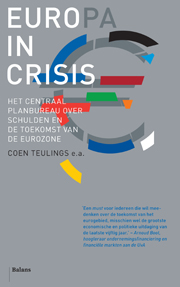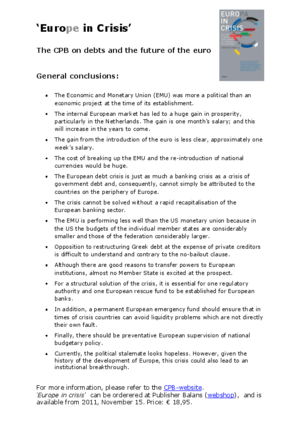Europe in Crisis
The European debt crisis requires more Europe

A significant part of Dutch prosperity is attributable to ‘Europe’. If the Economic and Monetary Union (EMU) were to break up the costs would be huge and our prosperity affected. In order to ensure the future of the EMU, it is essential more powers are transferred to Europe. This would not merely involve preventative European supervision of the budgets of Member States, but would include strengthening European regulation of the banking sector. The current crisis is, in fact, as much a banking crisis as a crisis of the debts of a number of countries in the eurozone (Greece, Ireland, Portugal, Spain, Italy). These are the arguments put forward in a book published today by Coen Teulings, Michiel Bijlsma, George Gelauff, Arjan Lejour and Mark Roscam Abbing entitled: 'Europa in Crisis. Het CPB over schulden en de toekomst van de Euro' [Europe in Crisis. The CPB on debts and the future of the euro] (Published by Balans).
In the book, the authors explain in a comprehensible way how it was possible for the current crisis to arise and what the most important measures are to ensure a similar crisis is avoided in future. The debt burden of the, in general, southern eurozone countries is not exclusively the consequence of out-of-control government budgets; the private sector had also accrued considerable debts, for example via investments in property in Spain and Ireland. Banks in the northern eurozone countries also contributed by lending too much money to the eurozone countries concerned. Better banking regulation in the eurozone is, therefore, essential.
Nor is transferring power free of commitment for the Netherlands. At the moment, the Netherlands is on the ‘good’ side of the crisis; but that could change in the future. The Netherlands has a large financial sector and extensive mortgage debts. Prescriptions concerning the retirement age or the right of dismissal could, for example, have consequences for our country.
Unlike most CPB publications, this book has been written for a wide public. The euro crisis is seriously impacting our daily lives and could have far-reaching consequences for our future prosperity. Everyone should have the chance to be well-informed, so that the discussion about the future of Europe can be conducted among a wider public. The CPB hopes this book will contribute to imparting this information.
'Europa in Crisis'/ CPB Book 4/ 240 pages with illustrations /
€ 18,95 / ISBN 978 94 600 3407 7 / 2011, November 14.
'Europa in Crisis' can be ordered at Publisher Balans (webshop) and is available in shops from 2011, November 15.
For more information, please refer to the CPB-website and Publisher Balans (in Dutch).
_______________________________________________________________
For interviews/press-related questions, please contact CPB, Edwin van de Haar, T: +31(0) 70 338 34 77, E: e.r.van.de.haar@cpb.nl.
For review copies or visual material, please contact Sylvie Steffers at Publisher Balans, T: +31 (0020 524 75 80, E: s.steffers@uitgeverijbalans.nl
Read the accompanying Press release.
Attachment: PDF-file including general- and chapter-conclusions.
A significant part of Dutch prosperity is attributable to ‘Europe’. If the Economic and Monetary Union (EMU) were to break up the costs would be huge and our prosperity affected. In order to ensure the future of the EMU, it is essential more powers are transferred to Europe. This would not merely involve preventative European supervision of the budgets of Member States, but would include strengthening European regulation of the banking sector. The current crisis is, in fact, as much a banking crisis as a crisis of the debts of a number of countries in the eurozone (Greece, Ireland, Portugal, Spain, Italy). These are the arguments put forward in a book published today by Coen Teulings, Michiel Bijlsma, George Gelauff, Arjan Lejour and Mark Roscam Abbing entitled: 'Europa in Crisis. Het CPB over schulden en de toekomst van de Euro' [Europe in Crisis. The CPB on debts and the future of the euro] (Published by Balans).
In the book, the authors explain in a comprehensible way how it was possible for the current crisis to arise and what the most important measures are to ensure a similar crisis is avoided in future. The debt burden of the, in general, southern eurozone countries is not exclusively the consequence of out-of-control government budgets; the private sector had also accrued considerable debts, for example via investments in property in Spain and Ireland. Banks in the northern eurozone countries also contributed by lending too much money to the eurozone countries concerned. Better banking regulation in the eurozone is, therefore, essential.
Nor is transferring power free of commitment for the Netherlands. At the moment, the Netherlands is on the ‘good’ side of the crisis; but that could change in the future. The Netherlands has a large financial sector and extensive mortgage debts. Prescriptions concerning the retirement age or the right of dismissal could, for example, have consequences for our country.
Unlike most CPB publications, this book has been written for a wide public. The euro crisis is seriously impacting our daily lives and could have far-reaching consequences for our future prosperity. Everyone should have the chance to be well-informed, so that the discussion about the future of Europe can be conducted among a wider public. The CPB hopes this book will contribute to imparting this information.
Downloads
Authors

